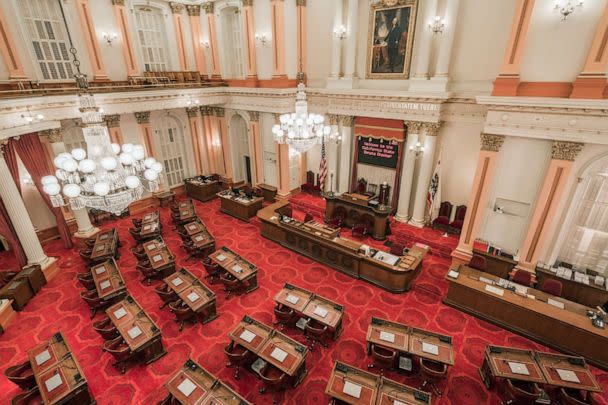What to know about California's approval of recommendations for historic reparations
A California reparations task force has voted to approve recommendations on one of the most significant reparations campaigns for African Americans in modern U.S. history. However, some critics have questioned whether the proposed reparations are sufficient to address systemic issues in the Black community.
The task force was established through a bill authored by then-Assemblymember Shirley Weber, currently California's first African American Secretary of State, according to task force chair Kamilah Moore. The bill was signed into law in September 2020 by Gov. Gavin Newsom.
The task force's next and final meeting will be on June 29 when the report will be released to the California legislator. Its supporters hope the report will be the foundation of a state bill, which could go to the legislature for a vote by the end of 2023 or early 2024.
Task force recommendations
The task force’s report follows the United Nations’ guidelines to remedy victims of international human rights violations, Moore told ABC News.
"The task force hasn't necessarily endorsed any particular dollar amounts," Moore said. "We just endorsed a methodology that the economists and public policy experts we hired used to calculate the total losses in the areas of health harms, the devaluation of black businesses, housing segregation, mass incarceration, and over policing and unjust property takings."

According to Moore, the task force proposed for eligible Californians to receive atonement under international law’s five forms of reparations: compensation, restitution, rehabilitation, satisfaction and guarantees of non-repetition.
Moore cited reparations for Japanese Americans who endured internment camps during World War II and remedies for Holocaust survivors in Germany as examples used in the task force's proposal to state legislators.
She said all African Americans in California who can trace back an enslaved or freed ancestor in the United States dating back to the late 19th century would be eligible.
Moore said $1.2 million is the most economists determined a resident could get if they were at the life expectancy mark of 71 years of age, or older, and endured more acute forms of racism for longer periods of time. She said some media outlets have reported misleading news, including claims that the task force is pushing for every Black Californian to receive $1.2 million.
MORE: Reparations task force listening tour lays foundation for next steps
'Deflects attention away'
According to the Pew Research Center, 77% of African Americans support reparations for the descendants of enslaved people.
But at least one prominent critic says reparations do little to address persistent issues faced by the community, such as poverty and gun violence.
Bob Woodson, a Black civil rights activist and founder of the Woodson Center, which aims to reduce crime and violence, said he believes that reparations would serve as a distraction from other issues.
"It really deflects attention away from the critical problems," Woodson said. "That is the moral and spiritual freefall that is consuming, not just Black Americans - that the highest death rate for our young people is homicide."
According to the Centers for Disease Control and Prevention, the leading cause of death for Black men under 44 years is homicide, at 26.1% for men ages 20-44 and 35.1% for those 19 and under.
But Andre Perry, senior fellow at the Brookings Institute who studies majority-Black communities and has done studies on reparations, says it is dangerous to separate these disturbing statistics from the root cause.
"Wealth is a predictor of many behaviors," Perry said. "People who are low wealth or have negative wealth, are much more likely to exhibit risky behaviors like violence."
Woodson said he was concerned about the economic toll the reparations payments would inflict on the state and its residents.
"For us to be taking seriously a discussion about whether or not a state should go bankrupt, almost, paying Blacks for reparations as if that would solve the problem," Woodson said.
Perry pointed out that states often create emergency funds when necessary and the same could be done for reparations.

Moore offered a suggestion from a state lawmaker to make payments in installments for a set number of years.
She said the economic loss faced by Black Americans in California due to systemic discrimination over the years is staggering. The amount calculated by the task force's economists is $800 billion, she said.
'The most important thing'
On the federal level, Rep. Cori Bush of Missouri announced a nationwide reparations bill on Wednesday that calls for $14 trillion to help close the wealth gap between African Americans and white Americans.
"The United States has a moral and legal obligation to provide reparations for the enslavement of Africans and its lasting harm on the lives of millions of Black people," Bush said at a press conference on the steps of the U.S. Capitol.
When asked how the government would pay out the sum of $14 trillion, Bush said she is engaged in talks to find the answer.
"We're still having those kinds of conversations," the congresswoman said at the press conference. "We're working with this administration, we're talking with other members of Congress… but I'll say this, if we can continue to fund these endless wars, or we can continue to put trillions of dollars into forever wars… we're talking about things that are happening now."
"The most important thing - our descendants," Andrea Jordan of Sacramento, California, said when describing what she would do with compensation through reparations. "To be able to leave that tangibles for them and otherwise I would not be able to do."
Jordan told ABC News of the toll inflicted on her grandfather after laws were passed decades ago in Mississippi to take his land.
"He understood as a man and as a Black man what they had done," Jordan said. "He was a mean person because of what they had done and died with a frown on his face from what he knew that he was not able to leave [for his family]."
Jordan believes African Americans deserve reparations.
"We started with such a deficit that our entire life couldn't even dig us out of it. So, this would even the playing field. And it's long overdue," Jordan said. "This country is drenched in our blood."
What to know about California's approval of recommendations for historic reparations originally appeared on abcnews.go.com
